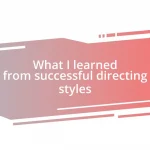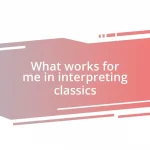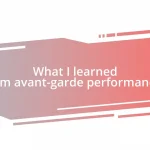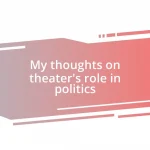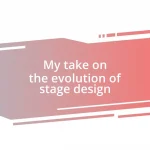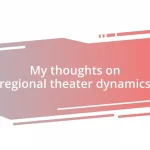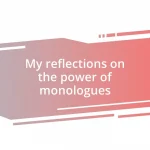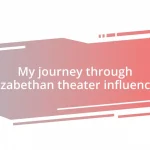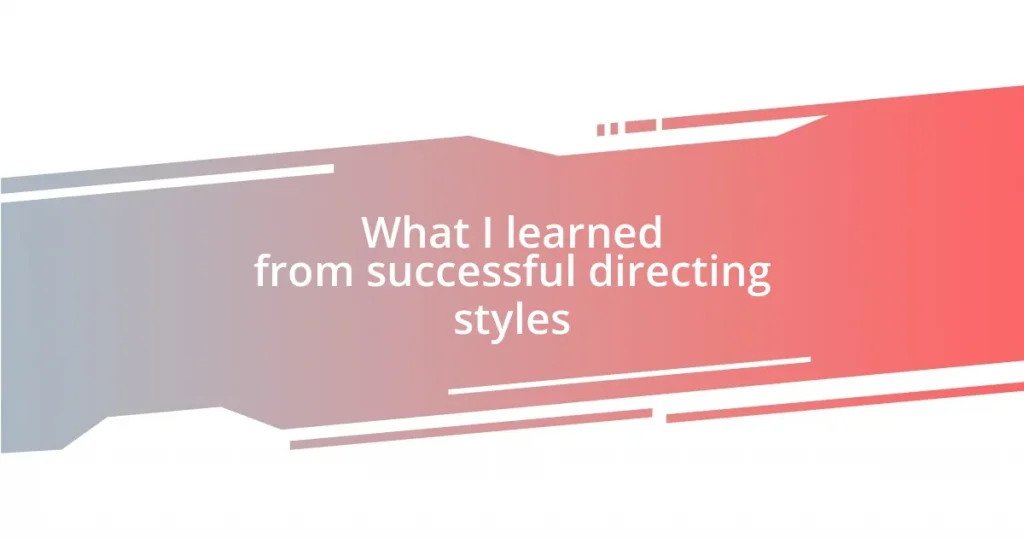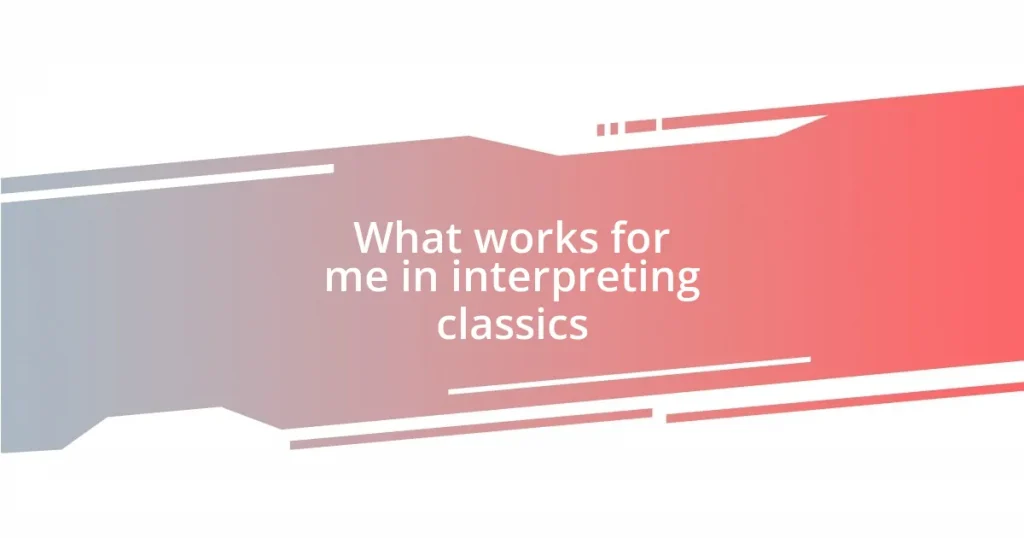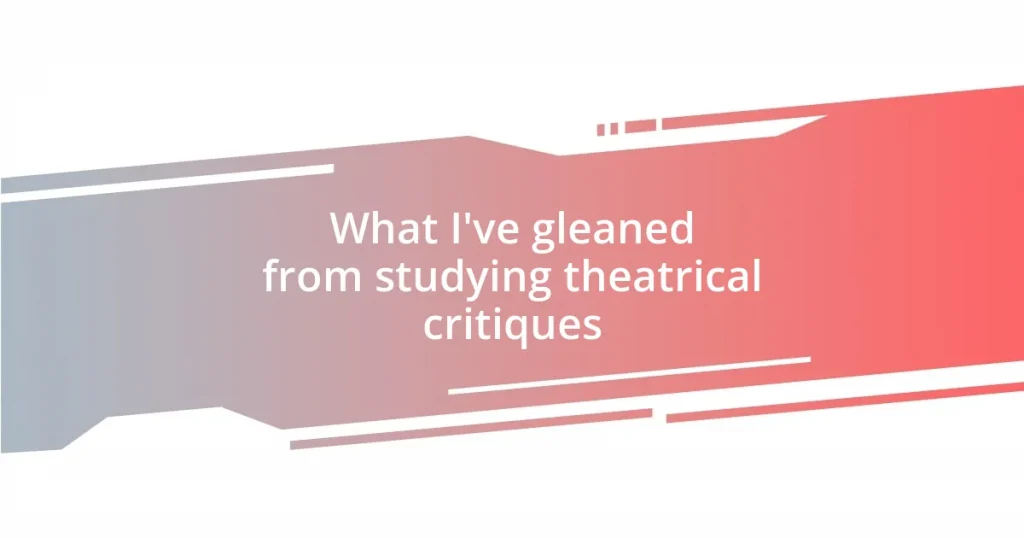Key takeaways:
- Auditioning should be viewed as an opportunity to share oneself rather than a test, enhancing the connection with the material.
- Effective preparation includes mental and physical readiness, utilizing techniques like visualization and creating a character’s playlist to ease nerves.
- Constructive feedback is essential for growth; it should be embraced as a tool for reflection and improvement after auditions.
- Networking authentically fosters relationships; expressing genuine interest in others can lead to future opportunities in the industry.

Understanding the Audition Process
Understanding the audition process isn’t just about the lines you deliver; it’s a complex dance of nerves, preparation, and intuition. For me, every audition starts long before I step into the room. I remember my first major audition—my heart raced, and I couldn’t help but wonder, “What do they really want to see?”
As I’ve grown in my craft, I’ve learned that the audition process is about telling a story, even in a brief moment. One time, I walked into an audition and decided to own my space by visualizing the character in a way that made me feel empowered. The way I connected with the material and showcased that connection transformed my performance. What if we all approached auditions not as a test, but as an opportunity to share a piece of ourselves?
In this journey, feedback is invaluable. I’ve had my share of rejections, and while they sting, they offer lessons I’ve come to cherish. Each callback teaches resilience, prompting reflections like, “What can I do differently next time?” Understanding the nuances of the audition process turns it from a daunting challenge into a rewarding experience filled with potential.

Preparing for an Audition
When preparing for an audition, I find that mental and physical readiness can significantly impact my performance. I often begin by immersing myself in the character’s world, tapping into their emotions and perspectives. On one occasion, I made a playlist that reflected my character’s backstory, letting the music set the tone before I walked into the audition room. It was amazing how those familiar melodies could ease my nerves and bring me directly into character.
Here’s a checklist that I swear by for effective audition preparation:
- Research the role: Familiarize yourself with the character’s background and motivations.
- Practice your lines: I always rehearse in front of a mirror to observe my expressions and body language.
- Choose appropriate attire: Wear something that represents the character while still being comfortable.
- Visualize success: Picture yourself owning that space and letting the character shine through.
- Stay hydrated and rested: It may sound simple, but being well-rested and hydrated sharpens focus and confidence.
- Arrive early: It gives me time to acclimate to the environment and reduce last-minute stress.
By honing these strategies, I transform my auditions into moments of creativity, rather than just tests of performance. Every preparation routine isn’t just about memorizing; it’s about finding that spark that can truly resonate.

Crafting Your Monologue
When I think about crafting my monologue, I focus on selecting material that resonates deeply with me. For instance, in one audition, I chose a piece that reflected my own struggles with identity. Sharing that part of myself on stage not only made my performance authentic but also allowed me to connect emotionally with the panel. It’s vital to pick a monologue that not only showcases your skills but also evokes a genuine response from both you and your audience.
As I refine my monologue, I pay close attention to the rhythm and pacing of the words. I recall a time when I intentionally slowed down certain lines to build tension, which created a palpable anticipation in the room. Adjusting the tempo can significantly impact how the audience experiences the emotions in your piece. By varying the speed and volume, I learned to engage listeners on a different level, keeping them invested in the story I was telling.
Moreover, practicing my delivery is where the magic happens. I often perform my monologue in front of friends, seeking their feedback on what feels authentic. There was a moment when a close friend pointed out a subtle gesture I was making that perfectly encapsulated the monologue’s message. It reminded me that sometimes, the smallest details can profoundly influence the overall performance.
| Elements of Crafting a Monologue | My Insights |
|---|---|
| Selecting Material | Choose something that reflects your own experiences for authenticity. |
| Rhythm and Pacing | Vary speed and volume to engage your audience emotionally. |
| Practice Delivery | Perform in front of others to gain feedback and refine subtle gestures. |

Mastering Cold Reads
Mastering cold reads can feel daunting, but I’ve learned a few tricks that have made me more comfortable with the process. One technique I often use is breaking down the script quickly into beats. When I encounter unfamiliar material, I find it helpful to identify key emotional shifts and objectives. It’s almost like mapping out the emotional landscape before taking the plunge—I remember one instance where this method allowed me to discover layers in a character I hadn’t noticed before, leading to a much more dynamic read.
Additionally, I focus on staying present in the moment. When it’s my turn to read, I remind myself that it’s okay to make bold choices. I recall auditioning for a role that required a deep vulnerability, and I tapped into my own feelings of uncertainty at that moment. Letting those emotions surface while reading brought authenticity to my delivery, and I realized how precious it is to share genuine moments, even in a cold read. It’s about making connections, both with the text and the casting team.
Another essential aspect of mastering cold reads is practicing regularly. I often gather with fellow actors to share snippets from scripts we’ve never seen before. In one of those practice sessions, I found myself reading a scene that completely challenged my usual approach, pushing me out of my comfort zone. That thrill of spontaneous performance can actually help build my confidence. Have you ever had an experience where you surprised yourself in a read? I’ve learned that embracing the unknown in cold reads can transform anxiety into excitement.

Building Confidence in Auditions
Building confidence in auditions is often about mental preparation. I remember one audition where I felt the weight of my nerves pressing down on me like a heavy backpack. Before stepping on stage, I took a moment to center myself with deep breaths and positive affirmations, telling myself that I was capable and ready. That simple practice transformed my fear into focus, allowing me to perform without second-guessing myself.
Another strategy that has worked wonders for me is visualization. I often spend time imagining my success before I even arrive at the audition. I picture the panel smiling and nodding in approval as I deliver my lines. One day, I decided to keep a journal where I documented these positive visualizations. Looking back, I can see how this practice constantly reminded me that I was prepared, and it truly shaped my mindset going into auditions.
Lastly, I believe in the power of community. Surrounding myself with supportive fellow actors has been a game-changer for my confidence. I still cherish the memory of a small group of us sharing our fears and triumphs over coffee before an audition day. We cheered each other on, and it blew my mind how our collective energy helped ease the pressure. Does it make you feel lighter to share your anxieties with someone who understands? For me, that connection created a comfortable atmosphere, making it easier to walk in and own my moment.

Networking with Industry Professionals
When it comes to networking with industry professionals, I’ve found that being authentic is key. I still remember attending a local theater event, where I struck up a conversation with a director. Instead of pitching myself right away, I asked about their latest projects and shared my genuine enthusiasm for their work. This laid the groundwork for a comfortable rapport, which led to future opportunities. Have you ever noticed that people are more receptive when you show genuine interest in what they do?
Building relationships in the industry is often about being proactive and persistent. After meeting someone I connected with at a workshop, I made it a point to follow up with a brief thank-you email. In that message, I mentioned a specific detail from our conversation, which not only reminded them of our chat but also kept the door open for future dialogue. This small touch can make a world of difference. Don’t you think a personalized approach can create lasting impressions?
I’ve also learned that attending industry events can be a great way to network, but it requires stepping outside your comfort zone. I vividly recall walking into a crowded networking mixer, feeling a wave of anxiety wash over me. Instead of lingering at the snack table, I took a deep breath and approached a group of strangers. With a smile, I introduced myself and mentioned my interest in collaboration. The atmosphere shifted dramatically; our discussion flowed, and I realized that everyone was eager to connect. In those moments, I often wonder—how many opportunities arise from simply putting ourselves out there?

Analyzing Feedback from Auditions
Receiving feedback after auditions can feel like a whirlwind of emotions. I remember my first audition where I eagerly awaited the panel’s comments. At first, when they pointed out my pacing issues, all I could think was, “How could I have overlooked that?” But taking a step back, I learned that constructive criticism is really an opportunity to grow. Embracing this mindset transformed my hearing into a reflective process rather than just a critique of my performance.
In another audition experience, I received feedback that seemed contradictory; one panelist loved my energy, while another felt it distracted from the emotional depth of the scene. Initially, this left me perplexed, but instead of feeling defeated, I viewed it as a chance to clarify my artistic choices. I began to experiment with different interpretations in rehearsals, searching for a balance that felt authentic. How often do we allow differing opinions to fuel our creativity rather than stifle it?
Analyzing feedback can be like piecing together a puzzle. I often jot down notes immediately after an audition, capturing every comment and feeling I had during the process. Reflecting on this later helped me identify patterns in the feedback I received. It’s fascinating how patterns can reveal insights about my strengths and areas for improvement. Have you ever noticed how some feedback resonates more than others? For me, it tells me where to focus my energy moving forward, shaping my preparation for the next audition.
